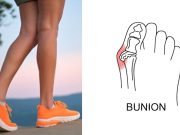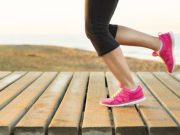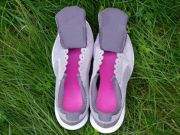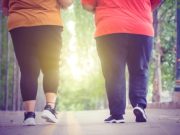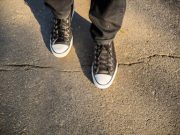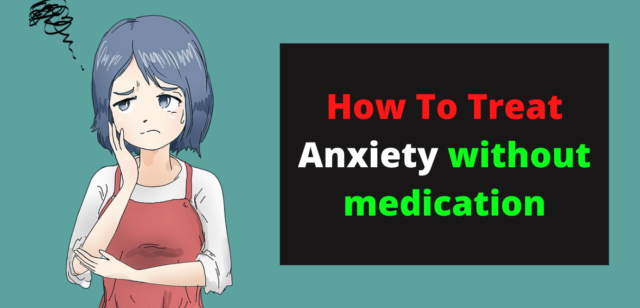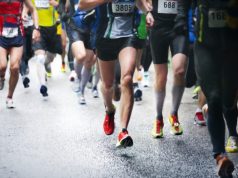Anxiety can be triggered by stress and difficult situations that make you feel like you don’t control the situation. When anxiety persists for an extended period, it may be considered generalized anxiety disorder (GAD).
Anxiety is natural and normal, but when it becomes too much to handle, then professional help should be sought out. So, the question is How To treat anxiety without medication…? and What are some signs that someone has GAD?
Many symptoms may indicate if someone has GAD- these include restlessness, irritability, fatigue/drowsiness due to insomnia or excessive sleep; difficulty concentrating; muscle tension; headaches; nausea/upset stomach; sweating excessively even during periods.
Anxiety is the feeling of worry, agitation, or unease that many people experience in anticipation of an event. It’s a normal human emotion, and most people feel anxious from time to time.
But for some people, anxiety can be debilitating, preventing them from living life as they want to live it. So In this blog post, we will learn How To treat anxiety without medication.
Table of Contents
Anxiety disorder symptom.?
Anxiety disorders are the most prevalent mental illnesses in America, with one in six people suffering from an anxiety disorder. Anxiety disorders can be debilitating and cause people to experience extreme fear and worry, making it difficult to function daily. Anxiety disorders are the most prevalent mental symptoms in the United States today, with 16% of adults or about 40 million Americans aged 18 years and older living with some form of anxiety-related condition. They’re more common than diabetes, cancer, heart disease, AIDS, and Parkinson’s combined! Those who suffer from any anxiety disorder must seek treatment, as these conditions cannot permanently be cured.
How To treat anxiety without medication :
Natural Remedies For anxiety and stress
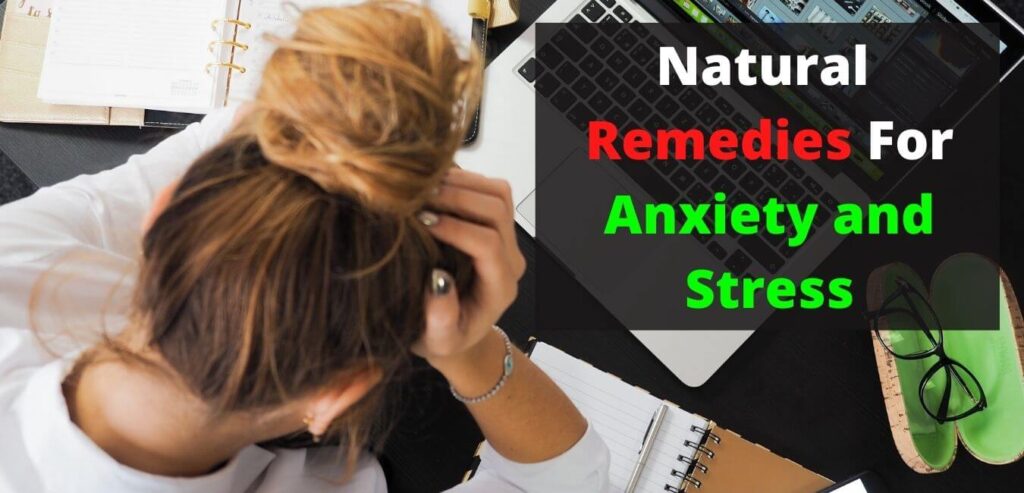
01: Exercise for anxiety
If you’re feeling anxious, don’t reach for a pill. Instead, try some exercise to help relieve the tension and anxiety that comes with an overactive mind. Exercise also helps improve someone’s mood by releasing serotonin in the brain, which effectively lowers depression-related symptoms when used as antidepressant medication. Check out the Best recumbent exercise bikes for your health.
02: Meditation
There are many reasons people suffer from anxiety, and one of the most common is stress. Meditation is a proven way to help manage your stress levels and live more peacefully.
Meditation is a great way to reduce stress and anxiety. It can be hard to find the time in your busy day for meditation, but it’s worth the effort.
Anxiety disorders are a type of illness where people have extreme feelings of worry or fear about things that may not happen. Research shows that practicing meditation as a way to reduce stress levels is effective at reducing symptoms related to anxiety including rumination, restlessness, and nervousness.”
03: Relaxation exercises
There are many relaxation exercises for anxiety available to help calm your nerves. These exercises can be practiced anywhere and include deep breathing, guided imagery, progressive muscle relaxation, mindfulness meditation, and yoga. All of these techniques work to reduce stress by slowing down your heart rate and calming your body’s “fight-or-flight” response. Here are some relaxation exercises that you may want to try to combat your anxiety:
- 1) Try deep breathing techniques- Breathe in through your nose deep into your stomach area and out through pursed lips while counting slowly up to 10.
- 2) Find somewhere calm and quiet where you feel safe.
- 3) Take time for yourself by reading, listening to music, or meditating.
- 4) Keep an eye on what makes you happy!
- 5) Exercise regularly.
- 6) Get plenty of sleep.
04: Writing
Many people suffer from anxiety, and they may want to write blogs but don’t know where to start. Here is a guide on how you can create compelling blog posts that will help your readers feel less anxious.
First, you should identify what topics the reader might be feeling anxious about and then provide them with strategies for coping with their stressors in these areas. One example could be “How to Overcome Social Anxiety.” Next, offer your readers some tips on how they can improve their self-care practices which would include things like exercise or meditation.
05: Time management strategies
There are many strategies to manage anxiety, but what about time management? After all, if you’re feeling anxious and stressed out, it can be hard to focus on anything else. . Here are a few helpful tips for managing your time even when you’re struggling with anxiety:
• Learn how much sleep is proper for you. Try going without an alarm clock and see what happens naturally!
• Keep track of the amount of caffeine you drink per day to not turn into an addiction. Caffeine may initially help in high doses but will eventually increase anxiety after prolonged use or abuse.
• Make sure to prioritize self-care each week.
06: Herbal teas
Herbal tea is a natural remedy for anxiety and stress. The calming effects of herbal teas are due to specific compounds, such as L-theanine, that promote relaxation without drowsiness. These herbs also contain flavonoids which help fight oxidative stress in the body and reduce inflammation.
Tea has been viewed as a traditional remedy for centuries, and herbal teas are one way you can take advantage of these benefits.
Herbal teas for anxiety come in many flavors, so there’s something out there for everyone!.
Peppermint Tea is one of the oldest herbs out there. It has long been used in Ayurvedic medicine and other traditions worldwide because it’s so good at relieving upset stomachs, nausea, headaches, respiratory issues like asthma symptoms.
07: Time with animals
You can quickly reduce anxiety is by spending time with animals. The benefits of petting a dog, playing with cats, or simply watching fish swim in an aquarium are well-documented.
Still, we’ve compiled some specific tips below that may help you find relief from your anxiety symptoms, too.
08: Take deep breaths
We all know that deep breaths are good for reducing stress and anxiety, but did you know they can also be used to help reduce the symptoms of asthma? If you have asthma, take a few minutes out of your day to close your eyes and remember what it feels like to breathe deeply.
Place one hand on the stomach and another on the chest -inhale deeply for 3 seconds -hold for 1 second -exhale for 6 seconds -repeat five times. It may sound counterintuitive, but taking deep breaths can help reduce anxiety.
Studies have found that breathing in deeply for four seconds and then exhaling for eight seconds has a calming effect on the body. This is because shallow breathing often causes panic or anxiety, whereas deep breaths are more natural and relaxing.
To make this practice easier, try using a visualization technique called “4-8-8.” Inhale through your nose to the count of four, hold your breath for eight counts (or as long as you comfortably can) and then release it with a slow exhale through pursed lips to the count of eight.
09: Get enough sleep
Sleep deprivation is one of the leading causes of stress, leading to mental health issues. The National Sleep Foundation recommends that adults get 7-9 hours of sleep per night. Follow these tips so you can reduce your anxiety and depression by getting enough sleep!
- Stop drinking caffeine after 2 pm because it will keep you up at night.
- Make sure that your bedroom is dark, quiet, and relaxed before going to bed.
- Try not to go to work or school if you’re feeling sleepy because this could lead to accidents or mistakes being made on the job/at school due to lack of focus
10: Limit alcohol and caffeine
Caffeine and alcohol are proven to be anxiety-inducing substances, so it’s no surprise that people who struggle with anxiety often limit their intake.
But the two can also work together in a way that is beneficial for those with anxiety. When taken together, caffeine and alcohol can have an anti-anxiety effect on some individuals.
However, too much of each tends to cause more problems than it solves. To get the best results from this combination, it’s essential to understand how much is appropriate for you personally!.
But it has been shown that drinking too much can lead to excessive feelings of anxiety. Caffeine in coffee, tea, or soda drinks is also known for causing stress, pressure, and restless sleep patterns.
Natural Herbs For Anxiety and Panic Attacks
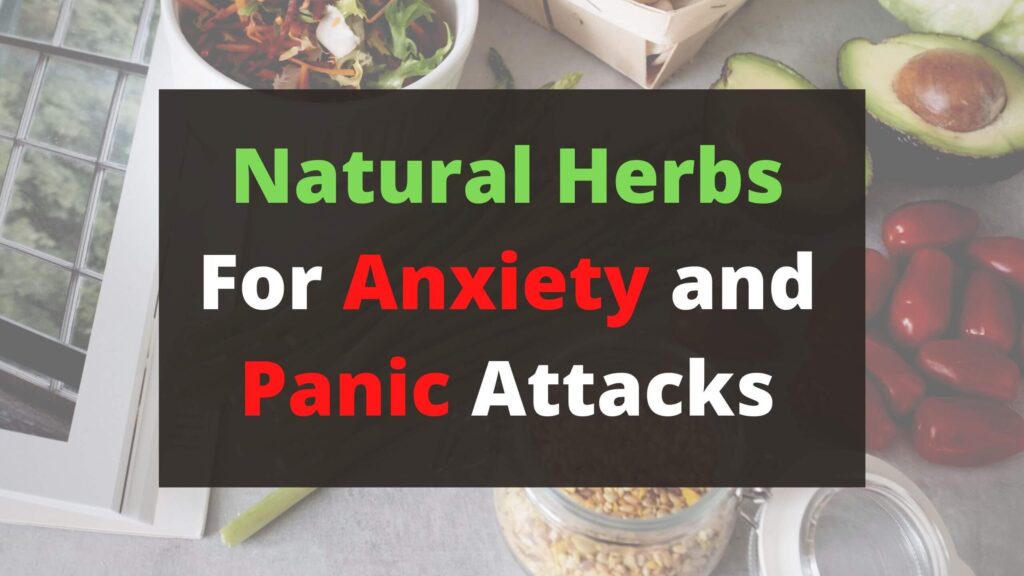
01: Ashwagandha Tea

Ashwagandha is a herb that has been used for centuries in Ayurvedic medicine to help calm anxiety and stress. It’s a natural anti-inflammatory, and it can also be used to treat inflammation of the brain.
The root of this plant has been shown to have many health benefits, including helping improve memory, learning, concentration, and mental clarity.
In addition to being a powerful antioxidant that helps fight free radicals and reduce oxidative stress on cells. It is often taken by people experiencing chronic fatigue or insomnia and those with allergies or asthma.
At the same time, there are not many clinical studies done yet on ashwagandha extract supplements specifically for anxiety.
02: Chamomile Tea
Chamomile is a perennial herb that has been used for centuries as a medicinal plant. It’s known to be calming and relaxing, with the ability to relieve anxiety and insomnia. Here are some tips on how to use chamomile in your day-to-day life:
1) Drink Chamomile Tea – Brew tea according to instructions listed on the package or follow this easy recipe: Combine one teaspoon of dried flowers per cup of boiling water. Steep for 5 minutes before drinking. Add honey if desired.
2) Use Chamomile Essential Oil – Apply topically by mixing oil into carrier oils such as jojoba, coconut, olive, or almond oil; apply neat (undiluted); diffuse aromatically.
03: Valerian Root Tea

Anxiety and insomnia are common mental health problems, but there is a solution. Valerian root extract has been used for centuries to help with these issues because it works on the neurotransmitters in your brain that regulate mood. It also enables you to sleep better at night!
Valerian root extract can be taken as a pill or tea, both of which have pros and cons. The pill form is less messy and more convenient, while the tea form tastes better and may be easier to remember to take throughout the day.
No matter what option you choose, valerian root extract will help you get some much-needed relief from anxiety without any side effects!
04: Lavender Tea

Lavender is a herb that grows in the Mediterranean, England, and America. Many cultures have been used throughout history to heal wounds, relieve pain from migraines or headaches, ease menstrual cramps, and soothe burns.
Lavender has been used as a natural remedy since ancient times for various ailments, including anxiety, depression, insomnia, migraines, and headaches.
It’s also great for taming acne-prone skin because it helps reduce inflammation in the body, which is one cause of acne breakouts. Lavender’s anti-inflammatory properties make it effective against many autoimmune diseases such as arthritis.
05: Galphimia glauca
Galphimia glauca is a flower native to Africa that has been used for centuries in folk medicine as a natural anxiety treatment.
In the last decade, scientific research has confirmed its effectiveness and safety. Clinical trials have shown that this plant can be highly effective at reducing anxiety symptoms without any side effects.
Studies show it’s possible to use Galphimia glauca in conjunction with modern anti-anxiety treatments such as selective serotonin reuptake inhibitors (SSRIs) or benzodiazepines, which are typically associated with more serious adverse effects like addiction and withdrawal symptoms.
The vast majority of people who try Galphimia report feeling better within minutes after taking their first dose.
06: Passionflower
Passionflower is a flower that has been used in herbal medicine for centuries. It was initially cultivated as a medicinal herb in Central and South America to treat anxiety, depression, insomnia, and stress.
The plant’s calming properties are due to chrysin and flavonoids such as apigenin which have soothing effects on the central nervous system.
Passionflower can be consumed in tea form or by adding dried leaves into food recipes like bread or cakes.
Passionflower is also available at your local grocery store. It may be found alongside other herbs like mint or thyme, making it an easy addition to any kitchen’s spice rack!
07: Kava kava
Kava kava works to reduce anxiety and promote sleep, making it an excellent natural alternative to prescription drugs such as Xanax or Valium.
A recent study found that taking 120 milligrams of kava per day significantly reduced anxiety symptoms in those who suffered from chronic stress disorder after just three weeks.
If you are currently suffering from an anxiety disorder, speak with your doctor about whether this herb might be right for you!
08: Cannabidiol (CBD)
Cannabidiol (CBD) is a naturally occurring cannabinoid shown to have therapeutic properties for anxiety. Although CBD’s effects are not well known, it can be an effective treatment for those with anxiety and its related disorders.
Here we explore how CBD works for stress and any side effects of taking CBD oil or other products containing this compound. Cannabidiol for fear is a new treatment option that has been gaining popularity in recent years.
The benefits of cannabidiol are many, but its most well-known use might be as an anti-anxiety medication. Studies have shown that people with a generalized social anxiety disorder or other forms of chronic stress and anxiety can benefit from cannabidiol to help them manage their symptoms.
Some studies show evidence of improved mental health after taking CBD oil over months or even years. Cannabidiol doesn’t cause intoxication as THC does, so there is no risk in taking too much, which means it can be taken every day if needed without worry about long-term side effects like addiction. This makes CBD perfect for anyone.
09: Lemon balm Tea
Lemon balm has calming effects attributed to two main ingredients: rosmarinic acid and ursolic acid. Studies have shown that these compounds work by increasing GABA levels, responsible for regulating brain activity.
This makes lemon balm an excellent choice for those who suffer from generalized anxiety disorder or panic attacks.
Lemon balm tea can also help with depression because of its ability to promote serotonin production in the brain while simultaneously inhibiting cortisol production (linked with stress).
When taken as a supplement, this herbal remedy typically comes in powdered form and is mixed into the water before drinking.
Also Read: Home remedy for gastritis attack
Foods to Avoid If You Have Anxiety
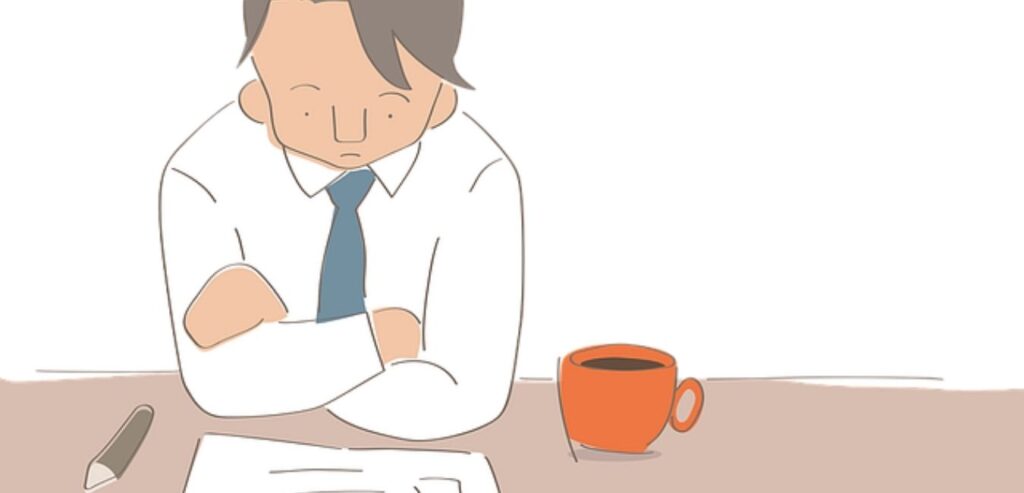
01: Coffee
Coffee is an excellent beverage for many reasons. It can energize and provide you with an energy boost in the morning or midday. However, if you suffer from anxiety, coffee can be problematic because of its caffeine content.
Caffeine can make your body more prone to feeling anxious than before. If this sounds like you, then there are some alternatives to coffee that could help alleviate your anxiety symptoms without being as caffeinated: green tea, chamomile tea, or black tea.
02: Energy Drinks
It’s been said that energy drinks are the new “smart drug” of choice for students and professionals looking to increase their productivity.
But what many people don’t realize is that these popular beverages, often marketed as a way to get an instant boost of energy, can cause anxiety in some people.
It’s unclear how this happens, but one theory is that they mess with your body’s natural levels of caffeine and dopamine-two chemicals that regulate moods. So while you might think you’re drinking a beverage just for its stimulant effects, it could also be contributing to your symptoms of anxiety or panic attacks.
03: White bread
Many people with anxiety disorders have found that eliminating white bread from their diet has alleviated some symptoms.
One reason for this may be the high levels of gluten, which can trigger an immune response in those sensitive to it. In addition, white flour is stripped of most vitamins and minerals during processing, so there’s not much left to nourish you except sugar or starch.
There are plenty of delicious alternative options like whole wheat pasta or flaxseed crackers that will help you keep your energy up throughout the day while also providing a healthy dose of fiber and protein!
04: Regular soda
It is hard to concentrate and focus when your thoughts are racing. To make matters worse, there is a good chance that the sugar in regular soda exacerbates anxiety symptoms.
One way to replace sugary drinks like soda without sacrificing flavor is by adding fruit juice or club soda into carbonated water. For instance, lemon-lime flavored seltzer mixed with fruit juice tastes just as good as an orange cola drink while providing more benefits! This type of beverage has no added sugars and doesn’t have caffeine either.
05: Chocolate
Chocolate is a lovely thing to consume and often brings comfort when we are feeling sad or anxious. In the United States, National Anxiety Awareness Month in April is a time for people to recognize their anxiety levels and seek help. But what happens if you love chocolate too much?
We all know that sugar can be addictive, but did you know it may also trigger an anxiety response for some? That’s right; your favorite bar of dark chocolate could make your symptoms worse rather than better.
06: Fried foods
The average American eats three times as many fried foods as they did in the 1950s. With a significant increase in anxiety disorders, it seems appropriate to explore how fried food impacts our mental health.
Fried foods are rich in omega-6 fatty acids that can cause inflammation throughout your brain and body. The constant release of cortisol from stress can lead to an increased risk for depression and anxiety disorders.
If you’re feeling anxious or depressed, try eating more fresh vegetables instead of fried foods.
07: Fruit juice
Anxiety is a mental disorder that can have many different symptoms and triggers. Some people experience anxiety as an intense feeling of worry or fear, while others may be more likely to feel restless, irritable, or keyed up.
Anxiety disorders are the most common type of mental illness in America today- with 1 out of every 13 adults affected. For some people, drinking fruit juice can cause extreme anxiety due to its high sugar content. The relationship between sugar and anxiety is still not fully understood.
Still, it seems like too much sugar causes your brain to release serotonin, making you feel anxious and jittery. By cutting down on fruit juices when you feel stressed or anxious, you will notice a difference in how those feelings manifest themselves in your body.
08: Alcohol
While it may be a good idea for some people with certain types of stress, drinking can make symptoms worse in others. Here is how:
Alcohol alters your brain chemistry and increases adrenaline levels which can lead to panic attacks. Alcohol causes dehydration by increasing urination which means the body will need more water to compensate.
Alcohol also reduces inhibitions which could lead to risky behaviors such as driving after having too much.
09:Light salad dressings
The oils in these dressings often cause an anxiety attack because they are high in Omega-6 fatty acids, which increase inflammation and cortisol levels.
This causes an imbalance between serotonin and dopamine, leading to feeling uncomfortable or overwhelmed. Although many other factors can cause anxiety, such as stress or lack of sleep, it’s essential to be aware that food can also contribute to this condition.
Find natural alternatives like olive oil dressings with vinegar for a healthier option that will help you live your life to the fullest, without fear of having another panic attack!
10: Ketchup
Ketchup can be used to top off tacos or add flavor to fries and onion rings. Although ketchup may seem like an innocent addition to your dish, it’s a known trigger for those with anxiety disorders.
The acidity in this sauce causes heartburn, which has been reported as a trigger for panic attacks and heightened feelings of anxiety by some people. Please consider trying other tomato-based sauces such as salsa or marinara sauce!
How to control anxiety?
It’s hard to find a sense of peace and calm when it seems like every day brings new challenges. These are some tools for fighting back against this feeling.
How can we manage our anxiety at the moment? What about long-term solutions? Research suggests that mindfulness meditation has benefits for mental well-being and provides relief from daily stressors.
If this sounds interesting but overwhelming, try starting with just one minute of mindful breathing each night before bedtime or at any time during the day when you’re feeling stressed out or anxious. So now You know How To treat anxiety without medication.
Also read: How to Get Rid of a Migraine Fast Without Medication
Faq :
How to treat anxiety without medication?
Anxiety has affected about 40 million adults in the US. Symptoms can range from mild to severe and include anything from feelings of fear or worry, difficulty concentrating, irritability, muscle tension, and more. There are plenty of treatments for anxiety, including therapy, medications, and lifestyle changes like exercise. However, many people don’t realize there are natural ways to treat their anxiety without prescription, such as mindfulness meditation, breathing exercises, or yoga, which can be done at home with some time and practice.
How to treat anxiety and depression without medication?
There are a lot of people who suffer from anxiety and depression. The question is, how can they treat these conditions without medication? One way is through therapy. Studies have shown that the combination of psychotherapy and antidepressants works better than either treatment alone. Another option for patients with depression or anxiety who want to avoid medication is self-help techniques, such as mindfulness meditation or exercise. These methods are effective at reducing symptoms for many individuals. A third method for treating both conditions without drugs is making lifestyle changes like getting more sleep, eating healthier foods, practicing yoga, simplifying life routines, etcetera. There are so many ways you can feel better without medications!






